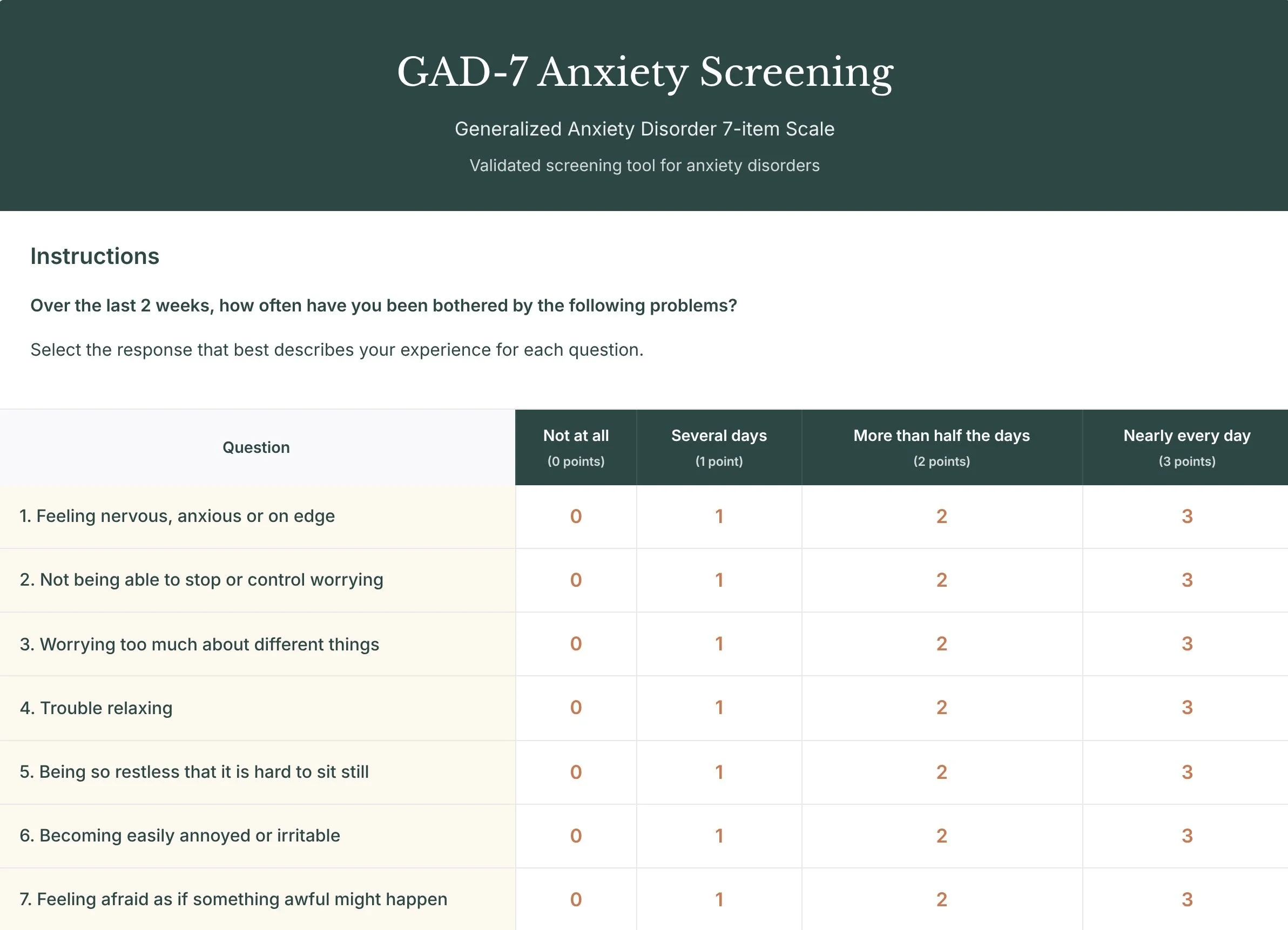Free Anxiety Screening Assessment
Understanding your results
Score Ranges and Meanings:
0-4: Minimal Anxiety
Few or no anxiety symptoms
Continue monitoring your mental health
Maintain healthy stress management practices
Consider anxiety screening if symptoms change
5-9: Mild Anxiety
Some anxiety symptoms present
Consider speaking with a healthcare provider
Stress management and relaxation techniques may help
Monitor symptoms—seek help if they worsen
10-14: Moderate Anxiety
Notable anxiety symptoms affecting daily life
Recommend consulting with a healthcare provider
Treatment options may include therapy and/or medication
Professional evaluation can determine best treatment approach
15-21: Severe Anxiety
Significant anxiety symptoms requiring attention
Seek professional help promptly
Comprehensive treatment typically necessary
Multiple treatment approaches often most effective
Important Note: Scores of 8 or higher suggest you may benefit from professional evaluation for anxiety disorders.
Next steps based on your results
If you scored 0-4:
Continue healthy stress management habits
Practice relaxation techniques regularly
Monitor your mental health
Know that help is available if symptoms develop
If you scored 5-7:
Consider lifestyle changes: regular exercise, adequate sleep
Practice stress reduction techniques
Monitor symptoms over time
Consider speaking with healthcare provider if symptoms persist
If you scored 8 or higher:
Schedule appointment with healthcare provider
Consider mental health professional consultation
Don't wait—early treatment prevents worsening
Multiple anxiety disorders can be effectively treated
If you're experiencing panic attacks or severe anxiety:
Contact healthcare provider promptly
Consider urgent care if symptoms are severe
Crisis hotline available 24/7: 988
Emergency services if you feel unsafe: 911
Anxiety treatment options
Therapy Approaches:
Cognitive Behavioral Therapy (CBT) - most effective for anxiety
Exposure therapy for specific phobias
Acceptance and Commitment Therapy (ACT)
Support groups and group therapy
Medical Treatment:
Anti-anxiety medications when appropriate
Antidepressants for certain anxiety disorders
Regular monitoring with healthcare provider
Medication combined with therapy often most effective
Self-Care Strategies:
Regular exercise and physical activity
Mindfulness and meditation practices
Deep breathing and relaxation techniques
Consistent sleep schedule
Limiting caffeine and alcohol
Social support and connection
Specialized Treatments:
EMDR for trauma-related anxiety
Specialized programs for specific anxiety disorders
Intensive outpatient programs when needed
When to seek immediate help
Contact crisis services right away if you have:
Panic attacks that feel life-threatening
Anxiety so severe you cannot function
Thoughts of harming yourself or others
Feeling completely overwhelmed and unsafe
Contact healthcare provider soon if you have:
GAD-7 score of 8 or higher
Anxiety symptoms lasting 2+ weeks
Symptoms interfering with work, relationships, or daily activities
Physical symptoms: rapid heartbeat, shortness of breath, chest pain
Avoiding important activities due to anxiety
Consider professional help if:
Worry feels uncontrollable most days
Sleep problems due to anxiety
Irritability affecting relationships
Difficulty concentrating at work or school
Types of anxiety disorders
The GAD-7 can help screen for:
Generalized Anxiety Disorder (GAD):
Excessive worry about multiple life areas
Difficulty controlling worry
Physical symptoms like restlessness and fatigue
Panic Disorder:
Recurring panic attacks
Fear of having more attacks
Avoidance of situations that might trigger attacks
Social Anxiety Disorder:
Fear of social situations and judgment
Avoidance of social interactions
Physical symptoms in social settings
Post-Traumatic Stress Disorder (PTSD):
Anxiety following traumatic events
Intrusive thoughts and flashbacks
Avoidance of trauma reminders
Anxiety support with Nest Health
Our Anxiety Treatment Services:
In-home therapy and counseling sessions
Specialized anxiety disorder treatment
Cognitive Behavioral Therapy (CBT) for anxiety
Medication management when appropriate
Family therapy and support services
Benefits of In-Home Anxiety Treatment:
Comfort and safety of familiar environment
Reduced anxiety about traveling to appointments
Personalized treatment in your space
Flexible scheduling around your needs
Family involvement when helpful
Getting Started:
Initial consultation to assess your needs
Develop personalized anxiety treatment plan
Connect with specialized anxiety therapists
Ongoing support and progress monitoring
Coordination with your primary care provider
If you’ve been contacted by Nest Health or your health plan and think you might be eligible for Nest Health’s services, call 866-222-NEST
Additional anxiety resources
National Organizations:
Anxiety and Depression Association of America (ADAA): adaa.org
National Alliance on Mental Illness (NAMI): 1-800-950-NAMI
International OCD Foundation: iocdf.org
Crisis Support:
National Suicide Prevention Lifeline: 988
Crisis Text Line: Text HOME to 741741
SAMHSA National Helpline: 1-800-662-4357
Online Resources:
Anxiety self-help tools and apps
Guided meditation and relaxation resources
Support groups and online communities
Important information
About This Screening:
This tool is for educational purposes only
Not a substitute for professional medical diagnosis
Results should be discussed with qualified healthcare provider
GAD-7 can screen for multiple anxiety disorders
Intended for adults 18 years and older
If you're in crisis, seek immediate professional help
Privacy Notice:
Your responses are not stored or tracked
Results are for your personal use only
No personal information is collected during screening
Share results with healthcare providers as you choose
All responses remain completely confidential


